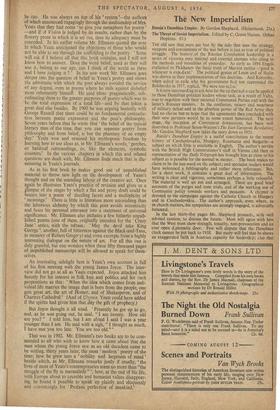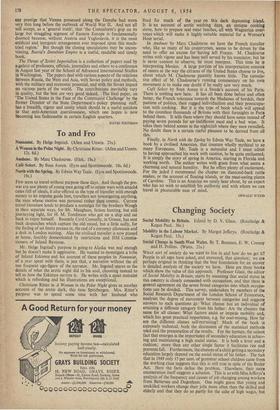Russia's Danubian Empire. By Gordon Shepherd. (Heinemann. 21s.) The Threat
of Soviet Imperialism. Edited by C. Grove Haines. (Johns Hopkins. $5.)
THE old saw that wars are lost by the side that uses the strategy, weapons and conventions of the war before is just as true of political struggle. The history of the Russian Communist leadership is a series of victories over internal and external enemies who clung to the methods and moralities of yesterday. As early as 1894 Engels explained to Plckhanov the basic truth of Marxist tactics—'good is whatever is expedient.' The political genius of Lenin and of Stalin was shown in their implementation of this doctrine. And Kerensky, when asked in exile why his government had not suppressed the Bolsheviks in 1917, replied, 'We were too nal we.'
It is now unrewarding to ask how far the ep,thet naive can be applied to those Danubian political leaders whose task, as a result of Yalta, .was to negotiate with their national Communist Parties and with the latter's Russian masters. In the confusion, misery and weariness of military defeat and in the absolute power of the Red Army they had no choice but to hope that the agreements they concluded with their new partners would be to some extent honoured. The next stage, the inception of Communist domination, has been well described in Professor Scion-Watson's The East European Revolution; Mr. Gordon 'Shepherd now takes the story down to 1953, Russia's Danubian Empire is a useful contribution to the recent history of Czechoslovakia, Hungary, Roumania and Bulgaria—a subject on whch little is available in English. The author's service with the British High Commissioner's staff in Vienna and then as representative of the Daily Telegraph has brought him as close to his subject as is possible for the normal w. sterner. The book makes no claim to be the last word on the subject; and specialist readers would have welcomed a bibliography and rather more references. But, for a short work, it contains a great deal of information. The writing is clear and vigorous, sometimes perhaps a little colourful. The material is well set out and arranged. There are good brief accounts of the purges and state trials, and of the working out of Communist policy towards workers and peasants. A chapter is devoted to the campaigns against the Catholic Church in Hungary and in Czechoslovakia. The author's approach, even where, as in church matters, his sympathies are stronglyengaged, is admirably balanced.
In the last thirty-five pages Mr. Shepherd proceeds, with well advised caution, to discuss the future. Most will agree with him that the West must show strength, tenacity, non-provocation and an ever open diplomatic door. Few will dispute that the Danubian clock cannot be put back to 1938. But many will feel that he shows an exaggerated faith in Austrian capacity for leadership; also that any prestige that Vienna possessed along the Danube had worn very thin long before the outbreak of World War II. And not all will accept, as a 'general truth', that 'the Cominform's grip on its large but straggling segment of Eastern Europe is fundamentally doomed because, without Austria and Yugloslavia, it is the most artificial and inorganic arrangement ever imposed upon this much- tried region.' But though the closing speculations may be uncon- vincing, Russia's Danubian Empire is a useful, readable and timely book.
The Threat of Soviet Imperialism is a collection of papers read by &galaxy of professors, officials, journalists and others to a conference in August last year of the School of Advanced International Studies in Washington. The papers deal with various aspects of the relations between Russia, the West and Asia, with Soviet policy and methods, with the military and economic potential, and with the Soviet impact on various parts of the world. The contributions inevitably vary in quality, but the best are very good indeed. The final paper, on 'The United States in the Face of the Communist Challenge' by the former Director of the State Department's policy planning staff, has a breadth, vigour and sanity which should be a useful antidote to that anti-American querulousness, which one hopes is now becoming less fashionable in certain English quarters.
DAVID FOOTMAN



































 Previous page
Previous page